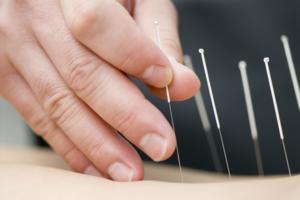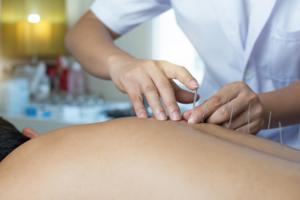![]() EXPERT
EXPERT
Jeff Rippey
Acupuncturist
- Saint Joseph, MO
- Colorado School of Traditional Chinese Medicine
- Accepting new patients
Why It's Hard To Tell Patients Where Needles Might Be Placed
I've been answering questions on this site for a couple of years now. There's been a recent trend towards acupressure questions which I addressed in my first blog post. Generally,...
Why It's Difficult to Answer Acupressure/Pressure Point Questions
As part of this site, patients have the capability of asking questions of practitioners and subject matter experts. Recently I’ve been seeing a lot of questions that take the...
What is better for sciatica acupuncture or chiropractor?
Does acupuncture help rotator cuff pain?
Does acupuncture work for neck pain?
Does acupuncture relieve tight muscles?
Can acupuncture help tight tendons?
Acupuncture treatments are cumulative, so you need to be prepared to attend at least 3 or 4 sessions before you decide whether or not it's working.
How does acupuncture help with seasonal allergies?
How many acupuncture sessions are needed for allergies?
On top of that, acupuncture treatments are cumulative in their effects. To a point, more treatment gives better results.
There are a couple of general rules:
1. Patients need to be prepared to attend at least 3-4 treatment session before they decide whether or not acupuncture is working for them.
2. A full course of therapy is often in the 10-12 treatment range.
How many acupuncture treatments are needed for migraines?
1. Not everyone experiences the same or similar symptoms for the same underlying reason(s). Since the underlying causes can be different, the treatments have to be different.
2. Not everyone responds the same way to acupuncture or herbal medicine. Some people get results very quickly, some people get results more slowly, and some people - no matter who the provider or how many visits - never get results. Currently, there's no good way to predict which of these cases you, as an individual, might fall into.
It also matters how severe the migraine and how long you've been experiencing them. Chronic issues often take longer to reach resolution, all other things being equal. All that being said, I specialize in pain management and I work a lot with migraines and headaches. Speaking very generally, I usually have the pain levels, episodic frequency, or both trending downwards by the 4th or 5th visit. A full course of treatment might be in the 10-12 range. I've had people go shorter and I've had people go longer. If you decide to pursue acupuncture for this issue, please make sure your provider is NCCAOM board certified and licensed by your state as an acupuncturist.
What pressure points get rid of headaches?
In the Chinese medical model, there are something like 5 or 6 different kinds of headache, each of which has its own treatment. For a more complete explanation of why your question is essentially un-answerable, please see this blog post: https://www.findatopdoc.com/Expert/81225813-Jeff-Rippey/Why-It-s-Difficult-to-Answer-Acupressure-Pressure-Point-Questions.
If you're interested in trying Chinese medicine to deal with your headaches, go to NCCAOM.org and use their "Find a Practitioner" look-up to get a list of local, board certified providers.
Where do they put acupuncture needles for migraines?
1. I don't know why *you* are experiencing migraines. Chinese medicine is individualized, which means that people may not be experiencing the same or similar symptoms for the same reason. We use a completely different diagnostic model and there's not nearly enough information provided for me to even hazard a guess as to why you're having migraines.
2. There are multiple different systems of acupuncture. These different systems often approach health issues in different ways and emphasize differing aspects of the Chinese diagnostic model. There is no guarantee that any other acupuncturist would choose to use the same points I might list.
If you're someone who has anxiety about the needles and where they might go, the best thing to do is go to NCCAOM.org and use their "Find a Practitioner" link. Get a list of local providers, call around to see who offers a free consult. Attend a few of these, meet the provider, let them give you a quick evaluation, and see how they might approach your issue. Then pick the one you are most comfortable with.
Is acupuncture or chiropractor better for migraines?
Can acupuncture cure nasal polyps?
Let's re-phrase - can acupuncture help improve nasal polyps or help to resolve any symptoms you may be experiencing due to nasal polyps? Hard to say, since you didn't specify any symptoms. Acupuncture has an excellent track record in the treatment of sinus congestion, runny nose, headache/sinus pressure, post nasal drip.
Specific to the polyps themselves, I'm not aware of any published literature showing acupuncture being effective in their treatment. Chinese herbal medicine, though, is another story. There are a couple studies showing the combination of acupuncture and herbs were effective in nasal polyp cases.
If this is something you'd like to try, I'd strongly suggest going to NCCAOM.org and using their 'Find a Practitioner' lookup to get a list of local, board certified practitioners. Since we're talking about potentially using Chinese herbal medicine, a PT or a chiropractor will NOT do.
Does acupuncture for insomnia hurt?
There are a variety of sensations which can occur as a result of having an acupuncture needle inserted. For someone who has never had acupuncture before, some of these sensations may be new and it's possible to confuse them with pain or discomfort.
In and of itself, acupuncture is relatively painless. I say relatively because different people have differing levels of sensitivity and different pain thresholds. It's a mistake on the part of most acupuncturists to refer to the procedure as 'painless' because that's not always true.
There may be a mild pinching sensation on initial insertion of the needle. This should fade in a second or two. If the 'sharp' or 'pinching' sensation doesn't fade fairly quick, tell your provider and have that needle removed or repositioned.
Normal sensations include a dull aching or dull throbbing around the needle. Sometimes there is a short lived electrical sensation (like pins and needles) that propagates up or down from the needle site. There also might be a mild distending sensation, like someone blowing a balloon up under the skin around the needle.
If you're unsure about any sensation you're noticing after needles are in, talk to your provider about what you're feeling.
Does acupuncture for neck pain hurt?
There are a variety of sensations which can occur as a result of having an acupuncture needle inserted. For someone who has never had acupuncture before, some of these sensations may be new and it's possible to confuse them with pain or discomfort.
In and of itself, acupuncture is relatively painless. I say relatively because different people have differing levels of sensitivity and different pain thresholds. It's a mistake on the part of most acupuncturists to refer to the procedure as 'painless' because that's not always true.
There may be a mild pinching sensation on initial insertion of the needle. This should fade in a second or two. If the 'sharp' or 'pinching' sensation doesn't fade fairly quick, tell your provider and have that needle removed or repositioned.
Normal sensations include a dull aching or dull throbbing around the needle. Sometimes there is a short lived electrical sensation (like pins and needles) that propagates up or down from the needle site. There also might be a mild distending sensation, like someone blowing a balloon up under the skin around the needle.
If you're unsure about any sensation you're noticing after needles are in, talk to your provider about what you're feeling.
In pain management cases, I always assume patients ask this question because the location in question already hurts and they're wondering if the addition of needles in that spot is going to make things worse. If this is your concern, I'd suggest trying to find an acupuncturist that practices mostly distant or distal acupuncture. Painful areas of the body can often be treated without having to place needles in the painful location. I've found that, in most cases, it's actually better not to place needles in the painful location.
In this case, you'd be looking for someone who practices Tung or Tan acupuncture. Depending on where you are located finding a skilled practitioner of these systems can be challenging. You can start with NCCAOM.org and use their 'Find a Practitioner' lookup to get a list of local, board certified providers. Then call around to a few and see who practices Tung/Tan.
Does acupuncture work for rhinitis?
How long should you do acupuncture for chronic headaches?
The general rule of thumb for chronic issues is one month of treatment for every year a patient has been experiencing the issue. The vast majority of the time, problems are brought to some level of resolution long before this - but it's a timeframe that folks with chronic conditions need to have in the back of their mind.
Speaking very generally, your headaches should at least be trending down in either episode frequency, pain severity, or both by the 4th or 5th session. A full course of therapy might be something like 10 or 12 treatments.
How long do the effects of an acupuncture session last?
I generally tell my patients that the first treatment's effects should last at least 24-48 hours. Sometimes the effect lasts longer, sometimes it lasts much longer.
How many acupuncture sessions does it take to see results for weight loss?
If your diet is in a good place, then I'd expect to see something in the range of 1-2 lbs of weight loss per week (on average, you'll probably experience more loss up front with a gradual level-off).
Is acupuncture once a month enough?
If you've just started acupuncture for your back pain, though, I'd be surprised if you get much traction with that amount of time between treatments. Usually I see pain management patients once a week for 3-5 weeks and then space the treatments out until either the pain goes away completely or we hit some maintenance interval that works for the patient.
Can acupuncture help reduce swelling?
Acupuncture, and particularly moxibustion, can often help resolve swelling, but if there is an underlying heart issue that is left undiscovered or untreated the swelling is the least of your problems.
I'd suggest starting with your primary care physician to see if they can figure out why your legs are swelling. If more serious root causes are ruled out, then you can pay a visit to NCCAOM.org and use their 'Find a Practitioner' link to get some local, board certified acupuncturists who may be able to help.





